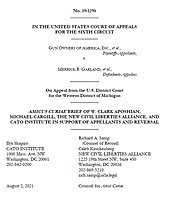Specifically, the administration changed the government’s long—held interpretation of “machineguns” to include bump stocks. This expansion of regulatory authority, motivated by political expediency, cannot stand. The executive branch must not be permitted to rewrite criminal laws.
The new rule took effect on March 26, 2019, making felons of an unknowable number of Americans. To prevent criminal liability for its members, the Gun Owners of America led a legal challenge to the rule in a federal district court in Michigan. After the district court sided with the government, the challengers appealed before a three-judge panel of the Sixth Circuit, winning a reversal that would have struck down the bump stock rule. But then the full Sixth Circuit court agreed to rehear the case, which is where things now stand.
Already, the Cato Institute has filed a brief supporting the Gun Owners of America—before the three-judge panel, Cato argued that the executive branch cannot use the administrative process to accomplish legislative goals that Congress declined to enact. In addition to that brief, which the full court will consider, Cato today joins the New Civil Liberties Alliance in a supplemental brief, arguing that the government’s interpretations of criminal statutes are not entitled to deference.



